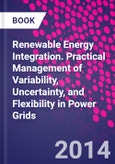Renewable Energy Integration is a ground-breaking new resource - �the first to offer a distilled examination of the intricacies of integrating renewables into the power grid and electricity markets. It offers informed perspectives from internationally renowned experts on the challenges to be met and solutions based on demonstrated best practices developed by operators around the world. The book's focus on practical implementation of strategies provides real-world context for theoretical underpinnings and the development of supporting policy frameworks. The book considers a myriad of wind, solar, wave and tidal integration issues, thus ensuring that grid operators with low or high penetration of renewable generation can leverage the victories achieved by their peers. Renewable Energy Integration highlights, carefully explains, and illustrates the benefits of advanced technologies and systems for coping with variability, uncertainty, and flexibility.
Please Note: This is an On Demand product, delivery may take up to 11 working days after payment has been received.
Table of Contents
1. The Journey of Reinventing the European Electricity Landscape Challenges and Pioneers 2. Policies for Accommodating Higher Penetration of Variable Energy Resources (VER's) 3. Harnessing and Integrating Africa's Renewable Energy Resources 4. Challenges and Opportunities of Multi-Dimensional, Multi-Scale Modeling and Algorithms for Integrating Variable Energy Resources in Power Networks� 5. Integrating Renewables in Nordic Electricity Market 6. Case Study of Renewable Integration Cal ISO USA 7. Impact of Variable Generation on Power System Reserve� 8. Advances in Market Management Solutions for Variable Energy Resources Integration� 9. Case Study: Reserve Management for Integrating Variable Generation in Electricity Markets� 10. Case Study: Grid and Market Integration of Wind Generation in Tamil Nadu, India� 11. Forecasting Renewable Energy for Grid Operations� 12. Probabilistic Wind and Solar Power Predictions� 13. Incorporating Forecast Uncertainty in Utility Control Centers� 14. Global Power Grids for Harnessing World Renewable Energy�� 15. Transmission Grids for Integrating On and Offshore Variable Generation Resources� 16. Case Study: Integration of Renewables Indian Experience� 17. Long Term Energy Systems Planning: Accounting for Short Term Variability and Flexibility 18. The Danish Case: Taking Advantage of Flexible Power in an Energy System with High Wind Penetration 19. Analyzing Power System Flexibility 20. Demand Response for Integrating Variable Renewable Energy: A Northwest Perspective�� 21. Case Study: Demand Response and Alternative Technologies in Electricity Markets�� 22. The Implications of Distributed Energy Resources on Traditional Utility Business Model� 23. Case Study: Application of Energy Storage for Renewable Integration��� 24. Renewables Integration on Islands� 25. Case Study: Intentional Islanding with Synchronous-Machine-Based Renewables� 26. Connecting Large Scale Solar to Power Grid� 27. State-of-the Art and Future Outlook of Integrating Wave and Tidal Energy� 28. Case Study: Integration of Renewables in Germany� 29. Control of Power Systems with High Penetration Variable Generation 30. Enhancing Situation Awareness in Power Systems Under Uncertainty� 31. Case Study: Managing Operational Uncertainty through Improve Visualization Tools in Control Centers� 32. Applications of Dynamic Line Rating to Integrating Renewable Energy� 33. PMU and WAMS Application to Renewables Integration� 34. Every Moment Counts: Synchrophasors for Distribution Networks with Variable Resources 35. Big Data, Data Mining, and Predictive Analytics and High Performance Computing








